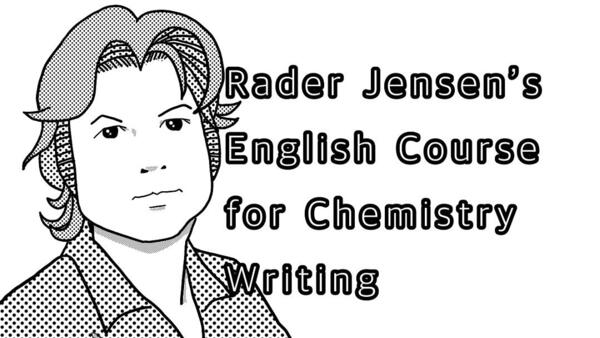CSJ Journals
[化学論文のための英語講座] 第22回:助動詞 can
(English version is here.)
「can」は可能性をはっきり述べます。「can」はできる、「cannot」はできないことを明示的に述べます。「can」の過去形「could」は過去を述べ、または条件文で使います。条件文、すなわち「if, then」の場合、または時間軸が未定義の場合、「could」は仮定の意味となります。過去の仮定文では「could have been」を使います。例文を幾つか見てみましょう。
1. Irradiation of Fe(CO)5 with UV light can promote formation of Fe2(CO)9 by CO elimination.
訳文:Fe(CO)5 に紫外線を照射すると、CO の脱離により Fe2(CO)9 の生成を促進することができる。
解説:「can」は可能であることを述べます。
2. We found that we could store diphosphinidenecyclobutenes (DPCB) under ambient conditions almost indefinitely.
訳文:DPCB を大気条件下でほぼ無期限に保存できることがわかった。
解説:「found」は過去形なので、「could」は可能であったこと(過去)を述べます。
3. The low yield could have been due to the solvent acting as a nucleophile.
訳文:低収率は、求核試薬として作用する溶媒が原因である可能性があった。
解説:「could have been」は、過去の仮定文で用いられます。
4. Development of an effective oligopeptide synthesis using flow synthesis could dramatically expand the availability of peptide therapeutics.
訳文:フロー合成を使用した効果的なオリゴペプチド合成の開発は、ペプチド治療薬の利用可能性を劇的に拡大する可能性がある。
解説:動詞は「could + expand」です。この文を単独で見たら、時間軸は未定義なので「could」は仮定の意味となります。
さらに詳しく見てみましょう。
5. The indole could be selectively cleaved by ozonolysis.
6. We were gratified to find that the indole could be cleaved by ozonolysis.
7. An additional possibility is that the indole could be selectively cleaved by ozonolysis.
例文5を単独で見たら、仮定と単純過去形の二つの意味が考えられます。
訳文:
a) インドールはオゾン分解によって選択的に切断される可能性がある(時間軸未定義な仮定文)
b) インドールはオゾン分解によって選択的に切断できた(単純過去文)
しかし、例文6、7のように文章を加えると(例文中のイタリック体)、判断できるようになります。
6訳文:インドールがオゾン分解によって切断できたことを発見して満足した。
「were gratified」は過去形であるので、「could」は単純な過去を表します。
7訳文:もうひとつの可能性は、インドールがオゾン分解によって切断される可能性であろう。
この文の主動詞は「is」であるので時間軸は現在です。そうすると「could」は仮定を表します。
[重要] 口語では「can」を仮定の意味として使うことが多いですが、文法的には誤りです。
次回は「助動詞may」です。
The auxiliary verb [can] expresses possibility. [Can] explicitly demonstrates possibility and [cannot] expresses impossibility. [Could] is the past tense of [can], and is also used in conditional statements. In conditional sentences, that is to say in the case of [if, then] statements or when the time frame is unknown, [could] expresses speculation. [Could have been] expresses speculation about the past. Let us look at a few examples.
Will is frequently used in research papers. Subject + will + bare infinitive describes a future prediction. Let us look at an example sentence.
1. Irradiation of Fe(CO)5 with UV light can promote formation of Fe2(CO)9 by CO elimination.
Explanation: [Can] expresses possibility.
2. We found that we could store diphosphinidenecyclobutenes (DPCB) under ambient conditions almost indefinitely.
Explanation: [Found] is a past tense verb and thus [could] expresses a past possibility.
3. The low yield could have been due to the solvent acting as a nucleophile.
Explanation: [Could have been] expresses speculation about the past.
4. Development of an effective oligopeptide synthesis using flow synthesis could dramatically expand the availability of peptide therapeutics.
Explanation: The verb here is [could + expand]. Looking at this sentence as it stands, it can be seen as a hypothetical statement.
Let us examine this in detail.
5. The indole could be selectively cleaved by ozonolysis.
6. We were gratified to find that the indole could be cleaved by ozonolysis.
7. An additional possibility is that the indole could be selectively cleaved by ozonolysis.
Seen alone, example 5 can be thought of as either simple past or speculation. That is to say, the indole was amenable to ozonolysis in a past procedure or indole is expected to be amenable to ozonolysis in the future. Whether the former or latter is intended would be understood from the context.
In example 6, [were gratified] is a past tense and thus [could] expresses a possibility in the past.
The main verb in example 7 is the present tense verb [is]. Thus, [could] expresses hypothesis.
Important: In spoken English, [can] is often used to express speculation, but this is grammatically incorrect.
At next time, we will discuss the auxiliary verb may.
